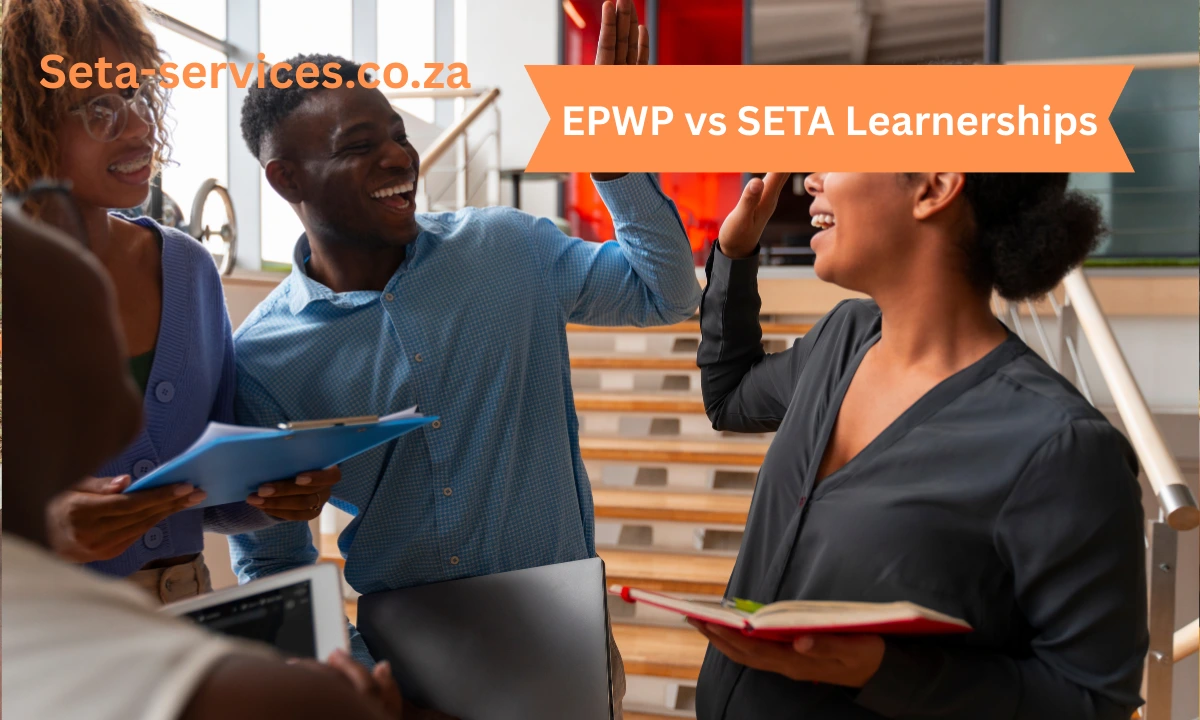EPWP vs SETA Learnerships
South Africa’s Expanded Public Works Programme (EPWP) and SETA Learnerships are vital initiatives tackling unemployment by offering work experience and skills development. While both aim to boost employability, they differ in structure, outcomes, and career impact. This 2025 guide compares EPWP and SETA Learnerships, detailing their features, eligibility, application processes, and which suits your career goals.
What Is EPWP?
The Expanded Public Works Programme (EPWP) is a government-led initiative providing temporary, labour-intensive work to unemployed South Africans, particularly low-skilled individuals. Launched in 2004, it aims to alleviate poverty through short-term jobs and basic training, managed by municipalities, government departments, and NGOs.
Key Features of EPWP
- Duration: Short-term contracts (3–6 months, occasionally up to 12 months).
- Focus: Labour-intensive tasks (e.g., road repairs, cleaning, community projects).
- Training: Basic work and life skills (non-accredited, limited scope).
- Stipend: Minimum wage or slightly above (R2,500–R4,500/month, varies by region).
- Sectors:
- Infrastructure: Construction, road maintenance, public building projects.
- Social: Home-based care, ECD support, community safety.
- Environment & Culture: Waste management, park upkeep, tourism initiatives.
- Non-State: NGO-led community projects.
Who Qualifies for EPWP?
- South African citizens or permanent residents, aged 18+.
- Unemployed with little to no work experience.
- No formal education required (open to all skill levels).
- Willingness to perform manual or community-based work.
- Preference for disadvantaged groups (e.g., women, youth, people with disabilities), per Employment Equity goals.
EPWP Benefits
- Immediate income through temporary jobs.
- Basic skills training (e.g., teamwork, workplace safety).
- No educational barriers, accessible to all.
- Contributes to community development and poverty reduction.
EPWP Limitations
- Short-term with no job security (contracts rarely extend).
- Low stipends, often below living wage (Stats SA 2025).
- No formal qualification, limiting career progression.
- Minimal training, less competitive in formal job markets.
What Are SETA Learnerships?
Sector Education and Training Authority (SETA) Learnerships are structured programmes combining theoretical training and practical work experience, leading to a National Qualifications Framework (NQF) qualification. Funded by 21 SETAs, each targeting a specific industry, learnerships prepare participants for careers in sectors like IT, finance, or agriculture.
Key Features of SETA Learnerships
- Duration: 12–24 months, depending on the programme.
- Focus: Industry-specific skills with NQF-aligned qualifications (Levels 1–8).
- Structure: 30% classroom learning, 70% workplace experience.
- Stipend: R3,500–R7,500/month (varies by SETA and employer).
- Providers: Employers, training providers, and SETA partnerships.
Types of SETA Learnerships
- MERSETA: Manufacturing, engineering (e.g., welding, NQF Level 4).
- HWSETA: Health and welfare (e.g., community health, NQF Level 3).
- FASSET: Finance, accounting (e.g., bookkeeping, NQF Level 4).
- AgriSETA: Agriculture (e.g., plant production, NQF Level 2).
- CATHSSETA: Tourism, hospitality (e.g., professional cookery, NQF Level 4).
- Services SETA: Business administration, marketing (e.g., office administration, NQF Level 4).
Who Qualifies for SETA Learnerships?
- South African citizens, preferably aged 18–35.
- Minimum Grade 9–12 (Matric preferred for higher NQF levels).
- Unemployed or underemployed with limited formal qualifications.
- Interest in a specific industry (e.g., IT, healthcare).
- Ability to commit to full programme duration (theory and practical).
SETA Learnership Benefits
- Nationally recognized NQF qualification, enhancing CV credibility.
- Industry-relevant work experience (70% of learners secure jobs post-programme, DHET 2024).
- Competitive stipends, often higher than EPWP.
- Pathway to further education (e.g., Diplomas, Degrees).
- Potential for permanent employment with host employers.
SETA Learnership Limitations
- Competitive applications (high demand, limited spots).
- Stipends, not salaries, may not cover all living expenses.
- Requires commitment to both training and work components.
- Educational prerequisites exclude some candidates.
EPWP vs. SETA Learnerships: Key Differences
| Feature | EPWP | SETA Learnership |
|---|---|---|
| Type | Temporary work | Structured skills training |
| Duration | 3–6 months | 12–24 months |
| Payment | Basic stipend (R2,500–R4,500/month) | Stipend (R3,500–R7,500/month) |
| Training | Minimal, non-accredited | Formal NQF qualification |
| Job Placement | No job guarantee | Potential for permanent roles |
| Requirements | No qualifications needed | Grade 9–12, industry interest |
| Industry Focus | Public works, manual labour | Specific industries (IT, health, etc.) |
| Career Impact | Short-term experience | Long-term skills and employability |
Which Is Right for You?
Your choice depends on your education, career goals, and immediate needs:
Choose EPWP If:
- You need quick income to support yourself or your family.
- You lack formal education (no Matric or qualifications).
- You’re open to manual labour or community-based roles.
- You seek short-term work while exploring other opportunities.
Example: A 25-year-old with no Matric joins an EPWP road maintenance project, earning R3,000/month for 6 months while applying for retail jobs.
Choose a SETA Learnership If:
- You have Grade 9–12 and want a formal qualification.
- You’re passionate about a specific career (e.g., business administration, engineering).
- You can commit to 12–24 months of training.
- You aim for long-term employability or further studies.
Example: A 22-year-old Matriculant joins a Services SETA Business Administration Learnership, earning R5,000/month and securing an office administrator role post-programme.
How to Apply in 2025
Applying for EPWP
- Check Local Opportunities:
- Visit your local municipality or government offices (e.g., Department of Public Works).
- Monitor provincial government websites (e.g., www.westerncape.gov.za for Western Cape).
- Contact NGOs or community organizations involved in EPWP (e.g., local waste management groups).
- Attend Recruitment Drives: Look for EPWP job fairs advertised in community centers or newspapers.
- Submit Documents: Provide a CV, certified ID copy, and proof of residence (no qualifications needed).
- Follow Up: Contact municipal offices (e.g., City of Johannesburg: +27 11 407 6111) for updates.
- Key Dates: EPWP recruitment is ongoing, but peaks align with fiscal budgets (April–June 2025).
Tip: Register on the Central Supplier Database (www.csd.gov.za) to access government project opportunities.
Applying for SETA Learnerships
- Identify Relevant SETAs:
- Visit www.dhet.gov.za or SETA websites (e.g., www.servicesseta.org.za, www.agriseta.co.za).
- Match your career interest to a SETA (e.g., FASSET for finance, HWSETA for health).
- Find Opportunities:
- Check job portals: SA Youth (sayouth.mobi), Indeed, CareerJunction, PNet.
- Visit employer websites (e.g., banks, hospitals, or training providers like Optimi College).
- Follow SETA social media (e.g., Instagram @etdpseta, @agrisetaofficial).
- Prepare Documents:
- Updated CV highlighting education and any experience.
- Certified copies of ID and Matric/Grade 9–12 certificates (within 3 months).
- Motivation letter explaining your interest in the learnership.
- Submit Application:
- Apply via SETA portals, employer websites, or email (e.g., learnerships@merSETA.org.za).
- Use Google Chrome for online applications to avoid technical issues.
- Key Dates: Deadlines vary (e.g., AgriSETA: 23 May 2025, Services SETA: 30 April 2025). Check SETA websites for 2025 intakes.
- Follow Up: Expect feedback within 14–28 days. Contact SETAs (e.g., MERSETA: +27 10 219 3000) if delayed.
Tip: Register with training providers like Liderazgo (www.liderazgo.co.za) or Petra Institute (www.petrainstitute.co.za) for learnership alerts.
Additional Notes
- EPWP Funding: Fully government-funded, no costs to participants. Projects may be affected by budget cuts (National Treasury 2025).
- SETA Funding: Learnerships are SETA-funded, with stipends guaranteed. Employers may require assessments or interviews.
- Verification: Confirm SETA learnership accreditation via www.saqa.org.za or ETDP SETA (www.etdpseta.org.za).
- Employment Equity: Both programmes prioritize youth, women, and people with disabilities, aligning with national transformation goals.
Which Offers Better Career Prospects?
- EPWP: Immediate income but limited long-term impact due to lack of qualifications. Best for survival while seeking better prospects.
- SETA Learnerships: Superior for career growth, offering NQF qualifications and industry experience. Ideal for building a sustainable career.
Data Point: SETA learners are 3x more likely to secure permanent jobs than EPWP participants (DHET 2024).
Take the Next Step
Ready to boost your employability?
- For EPWP, visit your local municipality or check www.publicworks.gov.za for 2025 projects.
- For SETA Learnerships, explore opportunities at www.dhet.gov.za, sayouth.mobi, or contact SETAs like Services SETA (+27 11 276 9600) or AgriSETA (+27 12 301 5600).
Choose the path that aligns with your goals and start building your future in South Africa’s job market!





